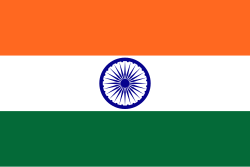| India at the 1994 Commonwealth Games | |
|---|---|
 | |
| CGF code | IND |
| CGA | Indian Olympic Association |
| Website | olympic |
| in Victoria, British Columbia, Canada | |
| Flag bearers | Opening: Closing: |
| Medals Ranked 6th |
|
| Commonwealth Games appearances (overview) | |
This was the 11th time India participated in the Commonwealth Games. [1] India ranked 6th in the final medal tally. [2]